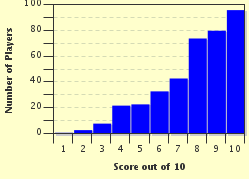Quiz Answer Key and Fun Facts
1. When I first meet someone, what would I say to them in Chinese?
2. After you ask how someone is doing, their response to you is: 'Wo hen hao'. What have they said to you?
3. As with any language, to be more polite, you can add thank you to your responses. How would you say 'thank you' in Chinese?
4. To introduce yourself you say 'Wo de ming zi shi _(your name)_'. After saying this, to ask the person you are speaking to what their name is, what would you say?
5. I just told someone: 'Wo de peng you jiao Harry". What did I just call Harry?
6. 'She is my aunt.' How would say this in Chinese?
7. 'Wo de ba ba he ma ma xi huan wo'. What have I just told you?
8. How would you say 'cousin' in Chinese?
9. Ge ge, di di, jie jie. Logically, which one have I left out?
10. True or False: Chinese names are different to Western names in the sense that they put their last name first.
Source: Author
Vy_lette
This quiz was reviewed by FunTrivia editor
trident before going online.
Any errors found in FunTrivia content are routinely corrected through our feedback system.

